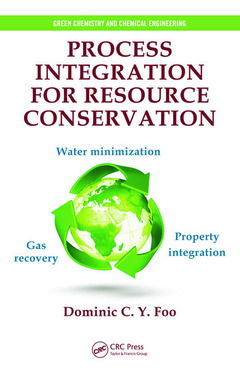Description
Process Integration for Resource Conservation
Green Chemistry and Chemical Engineering Series
Author: Foo Dominic
Language: English
Subjects for Process Integration for Resource Conservation:
Keywords
Interception Unit; Lean Stream; recycle and reuse of process streams in industrial plants; Fresh Resource; process integration and resource management; Process Sinks; environmental sustainability in industrial plants; Non-negative Values; resource conservation in industrial plants; Nonnegative Values; pinch analysis; Cascade Diagrams; material recovery in process plants; Ppm NH3; mathematical optimization; Composite Curve; process integration techniques for conservation problems; Wastewater Streams; design of resource conservation networks; Steam Jet Ejector; automated targeting model; Recycle Networks; material recovery of batch processes; Matching Matrix; material recovery across different plants; Direct Reuse; reusing and recycling utility gases; Outlet Concentration; reusing and recycling solvents; Reject Stream; reusing and recycling water; Pure Freshwater; reusing and recycling solid waste; Waste Treatment Units; Chemical Engineering; Material Cascade; Targeting Procedure; Mathematical Optimization Techniques; Mass Storage System; Water Storage Tank; Lower Quality Region; Seal Pot
Publication date: 08-2012
Support: Print on demand
Publication date: 07-2012
624 p. · 15.6x23.4 cm · Hardback
Description
/li>Contents
/li>Readership
/li>Biography
/li>
To achieve environmental sustainability in industrial plants, resource conservation activities such as material recovery have begun incorporating process integration techniques for reusing and recycling water, utility gases, solvents, and solid waste. Process Integration for Resource Conservation presents state-of-the-art, cost-effective techniques, including pinch analysis and mathematical optimization, for numerous conservation problems.
Following the holistic philosophy of process integration, the author emphasizes the goal of setting performance targets ahead of detailed design. He explains various industrial examples step by step and offers demo software and other materials online. Ideal for students preparing for real-world work as well as industrial practitioners, the text provides a systematic guide to the latest process integration techniques for performing material recovery in process plants.
Introduction. Data Extraction for Resource Conservation. INSIGHT-BASED PINCH ANALYSIS TECHNIQUES: Graphical Targeting Techniques for Direct Reuse/Recycle. Algebraic Targeting Techniques for Direct Reuse/Recycle. Process Changes for Resource Conservation Networks. Algebraic Targeting Approach for Material Regeneration Networks. Network Design and Evolution Techniques. Targeting for Waste Treatment and Total Material Networks. Synthesis of Pretreatment Network. Synthesis of Inter-Plant Resource Conservation Networks. Synthesis of Batch Material Networks. MATHEMATICAL OPTIMIZATIONTECHNIQUES: Synthesis of Resource Conservation Networks: A Superstructural Approach. Automated Targeting Model for Direct Reuse/Recycle Networks. Automated Targeting Model for Material Regeneration and Pretreatment Networks. Automated Targeting Model for Waste Treatment and Total Material Networks. Automated Targeting Model for Inter-Plant Resource Conservation Networks. Automated Targeting Model for Batch Material Networks. Appendix. Index.
Dominic C.Y. Foo, Ph.D., P.E., is a Professor of Process Design and Integration and the founding director of the Centre of Excellence for Green Technologies at the University of Nottingham Malaysia Campus. Professor Foo has authored more than 70 journal papers and made more than 120 conference presentations. He has been a recipient of the Innovator of the Year Award from the Institution of Chemical Engineers UK (IChemE) and the Young Engineer Award from the Institution of Engineers Malaysia (IEM).




